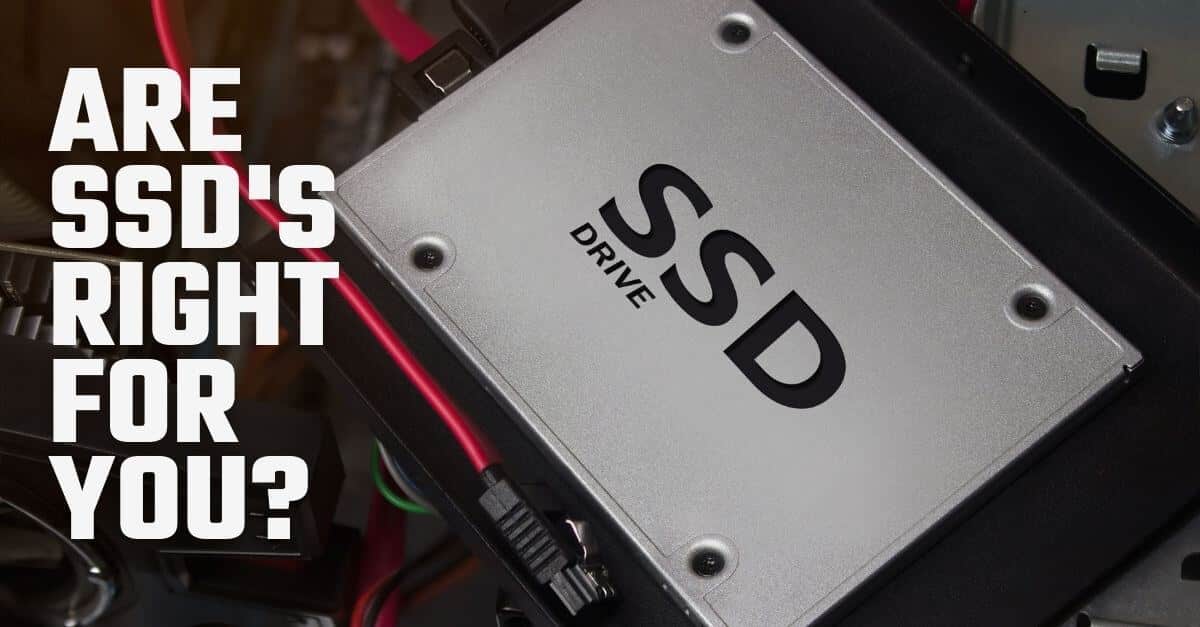Pros and Cons of Solid State Drives (SSD’s)

Since their inception in the 1990s, solid-state drives (SSDs) have emerged as one of the 21st century’s top digital storage solutions. These drives are now vying with the older and more established hard disk drive (HDD) for market dominance and consumer preference.
HDDs and SSDs are similar because both are designed to provide storage for laptops, desktops, and other everyday tech gadgets. These drives are where we store personal and business documents, photos, videos, and all other digital files. But unlike HDDs that use mechanical parts to read and write data to platters, SSDs use flash memory to save information.
SSDs read and write data to interconnected flash-memory chips. These chips are unique because they can hold data, even when power isn’t flowing through them. The lack of mechanical components means that SSDs are pretty small, making them ideal for laptops and other devices. Naturally, as demand for portable tech has increased, so too has the need for SSDs.
In 2020, 320 million SSDs were shipped across the globe. This device’s market share has more than tripled between 2015 and 2020, and the industry expects shipments to increase by 13% in 2021. In 2020, for the first time, more SSDs were shipped than HDDs.
There’s a reason SSDs are overtaking HDDs. When you’re considering the pros and cons of SSD vs. HDD, you might assume the advantages of SSD outweigh the drawbacks. But that’s not necessarily true for everyone. This list of SSD pros and cons will help you determine if an SSD is the proper storage solution for you.
Benefits of SSD
There are several pros and cons of solid-state drives. But for most, the advantages of using an SSD make the drawbacks worth it. Here are three of the top benefits of an SSD.
Fast read and write speeds
SSDs read and write faster than HDDs. A typical SSD can read at about 550 megabytes per second (MBps) and write at 520 MBps in normal conditions. On the other hand, an HDD can only read and write at 125MBps—more than four times slower than the SSD. Just looking at the numbers, you can see their performance is vastly different.
No moving parts
As we discussed before, HDDs have mechanical parts to read and write data to the disc manually. These moving parts cause most hard drive issues, which often result in data loss. SSDs have no mechanization and, as a result, are far less likely to fail.
But the lack of moving parts has an added benefit: no noise. The sound of an HDD humming is a universally familiar noise. But since SSDs have no moving parts, they make no sound.
Physical size
That absence of moving parts in an SSD means a much smaller design than their HDD predecessors. HDDs have motors, spindles and platters, all of which take up a lot of space. The chips comprising the SSD are thin and flat, just like the SSDs.
As devices needing storage get smaller, their hard drives need to as well. SSDs are slowly shrinking and, because of their composition, could continue to reduce in size.
Drawbacks of SSD
There’s much to consider before buying a hard drive, which is why understanding solid state drives pros and cons is so essential. And while there are many benefits of SSDs, there are SSD cons, as well.
Limited life span
Every SSD has a specific amount of times it can be read or written. This is called terabytes written (TBW). When you buy an SSD, the device comes with a predetermined “time of death,” which is impacted by how frequently you use the drive.
This may seem strange. But in actuality, these TBW limits are way more than the number of reads and writes performed by an average user. A recent study done by Google and the University of Toronto found that most SSDs fail due to age, not because they reached the TBW limit.
Cost
SSDs cost far more than their HDD counterparts. Usually, for comparable storage capacity, you’ll pay double for an SSD than for an HDD. The high cost is an SSD con, but depending on how you plan to use the drive, the price might be an investment worth making.
Difficult data recovery
Despite the cons of SSD, you might conclude that SSD is superior to HDD. But this is a tough argument to make when it comes to data recovery. Recovering data from SSDs is far more complex than from HDDs. Attempting to fix an SSD while preserving data is no small feat and should never be attempted on your own. If you have a falling SSD and need help recovering your data, we can help. Contact DriveSavers to save the information on your SSD!


